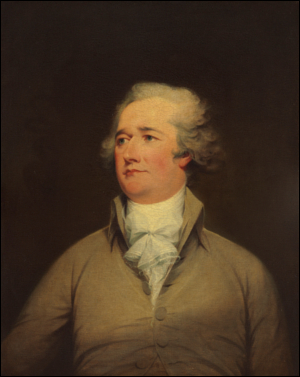1757-1804
Alexander Hamilton was born on January 11, 1757 (or perhaps 1755), in Charlestown on the island of Nevis, British West Indies. His early education was provided by his mother and by a local clergyman, but through monies raised by local mentors, he attended an academy in Elizabethtown, NJ in 1772, and then studied at King’s College (now Columbia University).
In 1776, Hamilton joined the Continental Army in New York as captain of Artillery. He was appointed aide-de-camp to General Washington on March 1, 1777, and served in that capacity until February 16, 1781. Hamilton was a member of the Continental Congress in 1782, 1783 and 1788. As a member of the Annapolis Convention of 1786, he authored a draft report that resulted in the Constitutional Convention the following year. Elected to the New York State Assembly in 1787, Hamilton was a member of the Philadelphia Constitutional Convention in 1787 that resulted in the adoption of the Constitution of the United States. Hamilton’s efforts then focused on the ratification of the Constitution by the States — he authored more than half of the Federalist Papers and was a member of the New York State ratification convention in 1788. Following ratification, Hamilton served as the nation’s first Secretary of the Treasury in the cabinet of President George Washington, from 1789 to 1795.
Following the Revolutionary War, the New York Legislature enacted a provision reducing the legal education requirements for veterans who had abandoned their legal studies to fight for their country. Hamilton obtained a dispensation based upon his studies at Columbia. He asked his friend, James Duane, for access to Duane’s extensive law library and, in July 1782, Hamilton was admitted to the bar without having fulfilled the usual requirement of three years’ study in a law office.
When the British army evacuated New York City, Alexander Hamilton moved there and opened a law office on Wall Street. He was recognized as an outstanding practitioner, and argued many cases before the New York Supreme Court of Judicature and the Supreme Court of the United States. He was counsel for the defense in the murder trial of People v. Levi Weeks, and in Rutgers v. Waddington, a Trespass Act case.
It was while he was in Albany arguing for the defendant in the criminal libel case of People v. Croswell that Alexander Hamilton attended a dinner party at the home of Judge Taylor and remarked that Mr. Aaron Burr was a dangerous man and ought not to be trusted with the reins of Government. Another guest wrote letters repeating the remarks, and the letters were published in the Albany Register. The long-standing bitterness between Hamilton and Burr escalated until, on July 11, 1804, Burr and Hamilton fought a duel in Weehawken, New Jersey. Burr mortally wounded Hamilton, who died in New York City the following day, July 12, 1804.
Source
Biographical Directory of the United States Congress.

